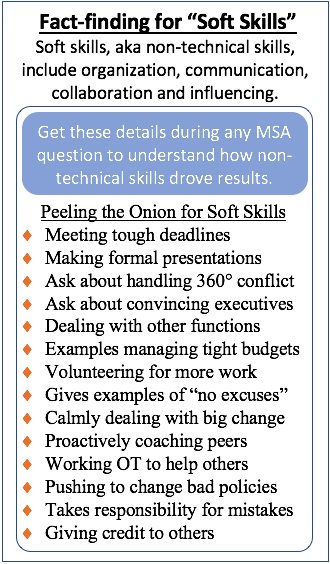… once a threshold of technical skills is achieved it’s the depth and quality of the person’s “critical non-technical” skills that propel their upward progress.
I’m not fond of most assessment tests, especially those that ask a bunch of either/or questions to determine personality type and “soft skills.” The problem with these assessments is that they assess preferences, not ability, and as a result generate too many false positives (right style but not competent) and false negatives (used a different style to succeed) to be useful for selection purposes.
In fact, these personality-related skills are far too important to be called soft and far too important to be measured in such an imprecise manner. Given their importance let’s call them “critical non-technical” skills. To take it one step further, I’ll contend that these critical non-technical skills are more essential than technical skills when it comes to hiring people. After tracking hundreds of people over 40 years it’s clear that once a threshold of technical skills is achieved it’s the depth and quality of the person’s “critical non-technical” skills that propel their upward progress.
Given this perspective, here are my top 15 or so critical non-technical skills and why they should never again be called soft.
- Cross-functional Collaboration. No one can tell me that successfully negotiating a critical series of product requirements with a team comprised of accounting, marketing, manufacturing and engineering that meets all of their competing needs is a soft skill.
- Responsible and Committed. No one can tell me that consistently meeting time and budget goals is a soft skill.
- Communication Skills, Detail-Oriented and Proactive. No one can tell me that presenting a monthly business review to a team of managers and company executives is a soft skill. Especially when the results missed plan and the person doing the presenting did a masterful job of knowing the details behind each variance and had already implemented an action plan to get back on track within 30 days.
- Staff Development. No one can tell me that building a strong team and helping them progress is a soft skill.
- Team and Interpersonal Skills. No one can tell me that proactively coaching and helping peers become better without any responsibility to do so is a soft skill.
- Initiative. No one can tell me that volunteering to handle a difficult project that will require lots of overtime and where there’s a high probability of failure, is a soft skill.
- Drive for Results. No one can tell me that being fully responsible for meeting goals and successfully achieving them month in and month out is a soft skill.
- Persuasive. No one can tell me that influencing a person’s manager or some senior executive to change his/her mind on some important course of action is a soft skill.
- Confident, Assertive and Courageous. No one can tell me that having the confidence and guts to stand up for an idea or complain about some shoddy process or wrongful action is a soft skill.
- Flexible and Cultural Fit. No one can tell me that being flexible, changing direction and staying motivated under a new set of business conditions is a soft skill.
- Herding Cats, aka Project Management. No one can tell me that leading a group of talented and opinionated people in a matrix organization and completing a complex project successfully is a soft skill.
- Leadership. No one can tell me that having a vision, putting a plan together, getting it approved, marshaling the resources and then achieving the results using all of the above is a soft skill.
- Coachable and Growth Mindset. No one can tell me that someone who can modify their behavior and do things differently or change their mind or decision when presented with valid evidence that their way is not the best way is a soft skill.
For these reasons and the dozens more left out, I contend we should ban the term “soft skills” and stop trying to peddle their importance in some soft, diplomatic manner.

For a more accurate assessment it’s better to ask the person to describe two or three of his/her major team and individual accomplishments and get examples of how these critical non-technical skills were used to accomplish the tasks. Then compare these accomplishments to the performance requirements of the job to more accurately predict fit and performance. Without this benchmark, whatever approach used to assess competency, fit and potential will yield results no better than a flip of the coin.
Bottomline: Since soft skills drive personal success, they’re far too important to be called soft.


